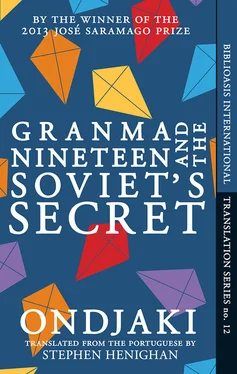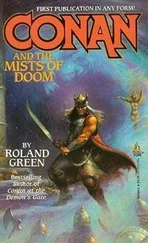“You okay, Granma?”
“Yes, my dear. Give me a kiss on the cheek.”
“How many toes did they cut off?”
“Only one, compañero .”
“ Mucho bien, ” 3.14 said. Nobody expected that; we all laughed again. Granma asked that nobody make any more jokes because shaking with laughter made her foot ache.
The elders went to the living room to speak with the nurse and Madalena was sent to the kitchen because she had stood there listening to the elders’ conversations.
3.14 and I pretended to stay on the veranda to play a game, but we were paying attention to what they were saying because Aunty Tó had the Jornal de Angola in her hand, and it looked like they were also going to talk about the drawing that Pi had called a description of a wish.
“We can’t wait much longer, we have to think about Mother’s future, where we’re going to put—”
We caught isolated phrases and it was only by pasting them together in our imagination that we understood the worries that they were discussing.
“Poor Dona Agnette. She’s lived here almost her whole life.”
“Her and all of these people. It’s going to be a problem.”
Which meant that nobody was talking about the children. It was all very well that our lives were still so short, but we also liked Bishop’s Beach a lot, and the elders always forget that when there are problems we can help to solve them.
“It’s just that they never include us when they talk about stuff.”
“We’re going to solve this, don’t worry.” Once again, 3.14 spoke in that serious way of his that made it sound as if he was at a political rally.
“But do you know how much dynamite they have there?”
“They have enough to blow up all the houses on Bishop’s Beach. I figure that amount’s enough for our plan. As long as nobody tells on us.” He glanced at me.
“You ever seen me tell on anybody?” I asked in a low voice.
“Have I ever seen you tell?” he laughed. “Every time we eat green mangoes with salt you end up telling your granma.”
“That’s different. She asks me how come I’ve got diarrhea and I can’t lie to her.”
“Just be ready.” He got up, tightened his belt, hitched up his trousers; he looked like a cowboy getting ready for the last shoot-out of his life. “This time you’re going to have to lie, even if they say they’re going to give you a beating.”
3.14 was speaking seriously. He got up on the low wall of the veranda and motioned for me to climb up as well.
From up there we could see almost all of Bishop’s Beach: on the left-hand side, the construction site of the Mausoleum, a few distant houses, Dona Libânia’s house, the gas pump; off in the distance, the house on the bend before the pretty church, the green houses, Sea Foam’s house, Paulinha’s house, Aunt Adelaide’s house; then right nearby, almost attached, Senhor Tuarles’s enormous house with his five daughters, of whom only Charlita had good glasses, the same house that had the old chicken coop where so many games were played and the smell of Granma Maria’s kitaba , with or without chili pepper, then the house of Gadinho, who wasn’t allowed to play with us, and beyond that, where we could no longer see, other houses: the house of Paulinho, who took judo classes and helped his father, and behind it the house of André, who was a commando and already had killed a ton of South African japies, and only now and then received authorization to come back and visit his family. War must not be anything like it is in the movies because when André comes home he’s hungry and so sad that he can’t speak a word; he cries when the truck comes to pick him up again and take him to some war zone. On the other side of the street was the bakery where, before five AM, people go to put their stones in the line-up that everybody respects, and right beside it is the alley where we play in our good clothes on Carnival of Victory Day with the whistle that Granma Catarina lends us; that alley is the muddy street that leads to the Kinanga Cinema, where they show ninja movies, and movies about Godzilla with his enormous mouth, about Trinità, about the Gendarmes and Gendarmettes of Saint-Tropez, and even the most delicious movie in the world, called The Big Brawl , with Jackie Chan and his uncle who fights like anything. After the Kinanga Cinema we could turn the corner and find the back of the church, where one time Senhor Tuarles had to go and beat the shit out of the priest who was being a pervert with the little girls of Bishop’s Beach; Senhor Tuarles sent Dona Isabel to go get his AK-47, but in the end he didn’t use it and just beat up the priest instead of killing him, and we were all up on top of the wall — yes, without that whole life that the elders had already lived but that we knew through the tales that we had seen and invented, as well as those that were told, retold or improved by Sea Foam, with his seashell-strung dreadlocks, stories of Kianda, who is also a mermaid, who the Old Fisherman says he saw but others say he couldn’t have seen, Granma Maria’s tales in Kimbundu, of which we never understood a word, not even today, because at school they never taught us to speak or write Kimbundu, tales told by the Comrade Gas Jockey when he drank and talked too much, tales told by Senhor Tuarles, who spoke little but also had charming tales about the old days, tales of Granma Catarina, who opened and closed windows; and lots of people go around saying that we, the children, are talking hogwash, that she no longer lives in the house of my Granma Nhé, who we now call Granma Nineteen: tales of Bishop’s Beach in the time of the tugas, with less dust than now, and it seems that people talked differently but also, after all, the country was under occupation and lacking any real independence, and, beyond that, so that you won’t say that I forgot about them, all of the tales that Granma Nineteen tells me; so many of them, with so many names, so many people and clothing styles, with dances and pianos and Fado music and trips and love affairs, with chats and thoughts and tenderness, and the silent pauses that are part of the tales that she tells me after lunch — and all that, at times, so often, I don’t know why, makes the elders think that we’re not going to remember everything, one day when we look back and think about our dusty Bishop’s Beach.
“Be ready.” 3.14 spoke gently, with his eyes nearly moist, and it wasn’t from the dust. “From this time onwards you’re going to have to lie when they ask you if we were the people who dexploded the Mausoleum construction site.”
The wind made a cute sound as it passed in a flying curve through the trees of Granma Nineteen’s yard: the old fig tree, the guava tree, the mango tree, the cherimoya tree, the bushes, the papaya tree, the red Brazilian cherry tree.
“I know, Pi, I know.”
After lunch Comrade Gudafterov arrived, drenched in sweat and reeking of body odour. He didn’t know it, but Granma Nineteen preferred him to visit at night, after 6PM, when he had taken his bath and washed his armpits, because if there’s one way to know that Comrade Gudafterov is near, that way is called Soviet Body Odour. Or simply “b.o.-dorov,” as Comrade 3.14 used to say.
“Kildren, you just play? Look at marvellous construction of Mausoleum. Very pretty, like big rocket, very pretty!”
“You’re gonna see that big rocket take off,” 3.14 said. His teeth were jammed tight together, but I understood him.
“Gudafterov no understand.”
“Just wait, Goofofferov, you’re gonna understand.”
“Kildren, Granma Nhéte come back good?”
“Yeah, she came back.”
“Gudafterov want greet her.”
Читать дальше












